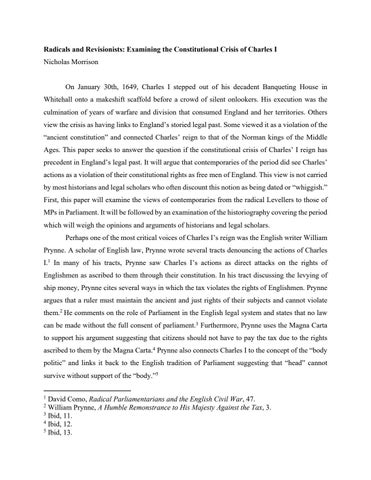Radicals and Revisionists: Examining the Constitutional Crisis of Charles I Nicholas Morrison On January 30th, 1649, Charles I stepped out of his decadent Banqueting House in Whitehall onto a makeshift scaffold before a crowd of silent onlookers. His execution was the culmination of years of warfare and division that consumed England and her territories. Others view the crisis as having links to England’s storied legal past. Some viewed it as a violation of the “ancient constitution” and connected Charles’ reign to that of the Norman kings of the Middle Ages. This paper seeks to answer the question if the constitutional crisis of Charles’ I reign has precedent in England’s legal past. It will argue that contemporaries of the period did see Charles’ actions as a violation of their constitutional rights as free men of England. This view is not carried by most historians and legal scholars who often discount this notion as being dated or “whiggish.” First, this paper will examine the views of contemporaries from the radical Levellers to those of MPs in Parliament. It will be followed by an examination of the historiography covering the period which will weigh the opinions and arguments of historians and legal scholars. Perhaps one of the most critical voices of Charles I’s reign was the English writer William Prynne. A scholar of English law, Prynne wrote several tracts denouncing the actions of Charles I.1 In many of his tracts, Prynne saw Charles I’s actions as direct attacks on the rights of Englishmen as ascribed to them through their constitution. In his tract discussing the levying of ship money, Prynne cites several ways in which the tax violates the rights of Englishmen. Prynne argues that a ruler must maintain the ancient and just rights of their subjects and cannot violate them.2 He comments on the role of Parliament in the English legal system and states that no law can be made without the full consent of parliament.3 Furthermore, Prynne uses the Magna Carta to support his argument suggesting that citizens should not have to pay the tax due to the rights ascribed to them by the Magna Carta.4 Prynne also connects Charles I to the concept of the “body politic” and links it back to the English tradition of Parliament suggesting that “head” cannot survive without support of the “body.”5 1
David Como, Radical Parliamentarians and the English Civil War, 47. William Prynne, A Humble Remonstrance to His Majesty Against the Tax, 3. 3 Ibid, 11. 4 Ibid, 12. 5 Ibid, 13. 2
